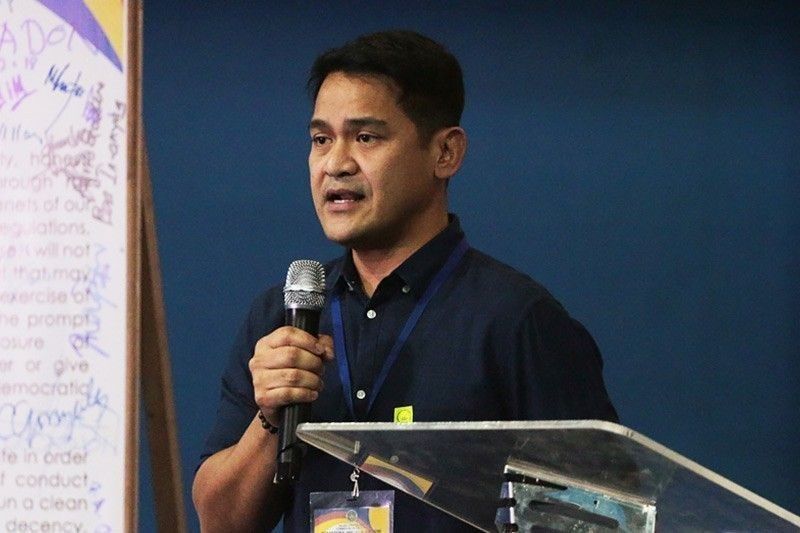Commentary: 'Handling' stories in the marketplace of ideas

In a recent interview on ONE News, senatorial aspirant Jiggy Manicad was asked about his views on the slew of cases filed against Rappler. The online news outlet has faced threats from the Duterte administration, from license revocation to tax evasion charges. Does he interpret these legal battles as an assault on press freedom?
For Manicad, Rappler’s battles should not be construed as an attack on the press. He believes that the cases have merit. If he had stopped there, Manicad would probably not have received flak from the College Editors Guild of the Philippines, which quickly condemned his response. However, Manicad continued with the following statement:
Now, because of that handling, someone got angry and ordered an investigation, does it really translate to an attack on press freedom? How come in other networks, it’s not like that?
Manicad described Rappler’s handling of its stories as an “attack” against the president that, in turn, provided sufficient basis for the president’s “counter-attack.” The implication here is, if Rappler had only presented its stories better—in a less “politicized” way—it would not have been where it is now legally. This seems to contradict Manicad’s initial response; if there is indeed a basis for the cases filed, why then should Rappler’s “handling” of its stories matter in the filing of those cases?
Threats to other journalists, news outlets
It is not true that other news outlets have not faced threats. It was only less than two years ago that President Rodrigo Duterte accused ABS-CBN and the Philippine Daily Inquirer of bias. He has expressed his disapproval of the renewal of ABS-CBN’s franchise and threatened to file multiple syndicated estafa charges against the network.
Meanwhile, an alarming number of journalists have been killed under this administration. Journalists have also been negatively affected by the administration’s war on drugs, compelled to sign as witnesses in the inventory of seized drugs as a condition to be allowed to cover the incident. This exposes them to perjury and harassment.
Unflattering reports are dismissed as “fake news” and reporters labeled as “presstitutes.” Such press climate can explain why the Philippines fell by six places in Reporters Without Borders’ 2018 World Press Freedom Index, from 127 to 133 (out of 180 countries).
How else can one characterize these empirical developments other than as attacks on the press?
Better 'handling'?
Needless to say, Rappler’s policy on how it presents its stories does not justify the president’s “counterattack or attack,” as Manicad put it. Under our laws, editorial policy should only guard itself against libel, which the Supreme Court defines as “the offense of injuring a person's character, fame or reputation through false and malicious statements.”
I strongly believe that the wisdom of criminalizing libel must be re-examined, although the Revised Penal Code and relevant case law already allow defenses for media defendants: (i) the truth of the imputation, and (ii) the offended person’s status as a public official or public figure, which elevates the discussion to a matter of public interest and thus merits increased constitutional protection.
The problem with Manicad’s answer is his definition of better “handling,” or the lack thereof. He described his own previous journalistic reporting as fair, but what is “fair”? What is biased, politicized? More importantly, who gets to decide?
Manicad seems to imply that there is one manner of reporting—one that satisfies the state—and there is one formula to get it right.
'Truth' in the marketplace of ideas
Manicad’s response draws out the nuances embodied in the “marketplace of ideas,” a metaphor that has come to define the parameters of freedom of speech in the Philippines. Truth has been the anchor on which and for which the marketplace functioned; it is both a means and an end. This explains why it serves as a strong defense against criminal libel.
Likewise, we rely on the free exchange of ideas to ferret out the truth and wield its liberating, enlightening force against false ideas and fake news. Even Manicad’s response reflects this, as if there was one way of reporting that would satisfy everyone’s perception of objectivity.
But there is a difference between a “false” idea and a falsehood. For verifiable data, fake news can be easily defeated. The Reality Check Team in the recent CNN Senatorial Forum 2019 demonstrated the power of fact-checking in making informed political choices. It’s a different matter altogether when the label “fake news” is used to silence opposing views.
United States Justice Holmes first introduced the concept of a “free trade in ideas” in his famous dissent in Abrams v. United States, a ruling that continues to dominate Philippine speech jurisprudence. According to Holmes, free trade includes letting the thoughts we despise into the marketplace and allowing the invisible hand of the market to arrive at the truth. The metaphor is appealing as it resonates with the tenets of deliberative democracy.
However, this also opens the possibility of an alternative understanding of truth. As Jared Schroeder points out in "Toward a discursive marketplace of ideas,” instead of perceiving truth as an absolute, objective notion, there is wisdom in viewing it as fluid, one in perpetual flux due to continuous “collective and connective interactions” and “crosspollinations” of ideas. This more accurately captures the “truth” in the realm of ideas and helps us grapple with the assumptions implicit in Manicad’s response. We get to decide what is fair, biased and politicized.
Unfortunately, it appears that rather than having a marketplace where ideas compete, Manicad would rather have a state monopoly.
Atty. Jenny Domino is a fellow for Democracy and Human Rights of think tank Stratbase ADR Institute, a partner of Philstar.com.
- Latest





























